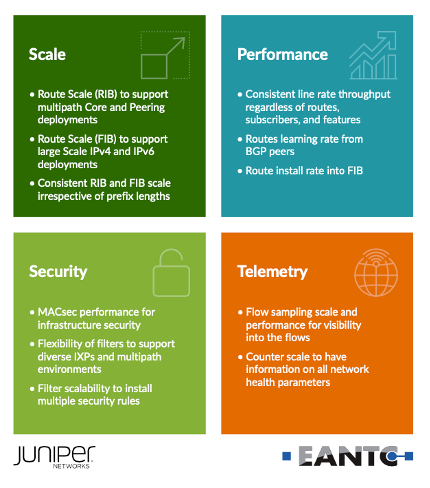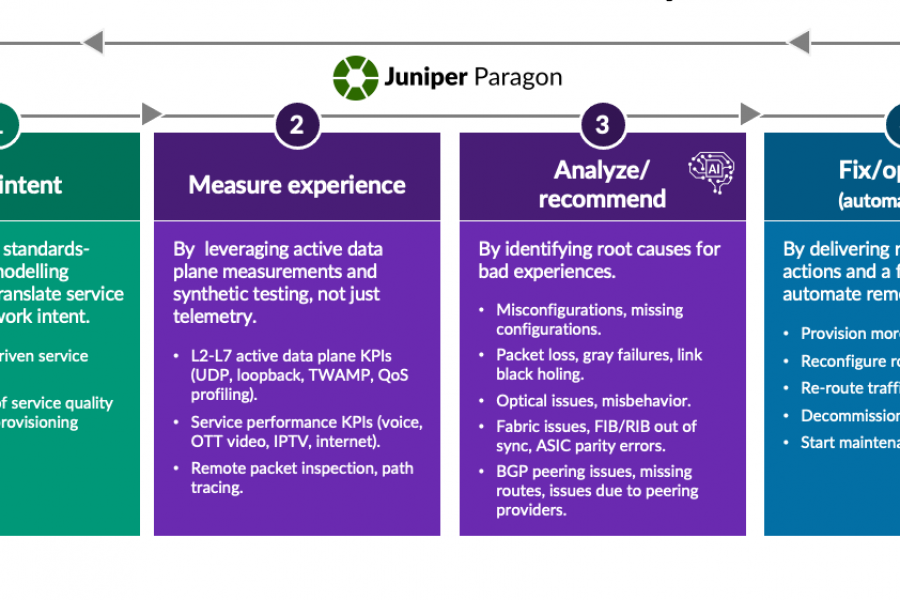Growth breeds complexity. But with complexity comes opportunity.
About 10 years ago, as the hyperscale cloud began to proliferate around the world and global telecommunications networks started becoming larger and larger to serve ever-growing subscriber and application demands, Juniper Networks paved the way with an architectural revolution we call the PTX Series router.
This seemingly insatiable demand for network capacity meant engineering new targeted silicon that simplified the different layers of a router and delivered a more cost-effective and scalable packet-forwarding engine than anything else on the market. This was – and is – fundamental to ensuring that some of the largest cloud and service provider networks on the planet run smoothly to deliver a new wave of services to businesses and consumers, regardless of size or deployment location. And the PTX is the trusted platform to consistently enable this for the biggest service provider networks across the globe.
Recently, the European Advanced Networking Test Center (EANTC) independently pitted Juniper’s PTX router head-to-head against Cisco’s 8201 router to determine which performed better across a number of key metrics that were chosen based on the needs and requirements of the world’s largest core and peering consumers – namely scale, throughput, filter scale, forwarding information base, sampling and Media Access Control security (MACsec).
The verdict? Juniper is the standout across the board.
According to the report, “Juniper showcased significant performance and flexibility in configurations of the filters, sampling and MACsec. The stability and efficiency in PTX10001-36MR and PTX10008-LC1201 routers were remarkable, and the maximum range of the filters supported per 400GbE port was impressive.”
EANTC Test Highlights
Juniper chose two 400G products from the PTX Series for benchmark testing: the PTX10001-36MR, a 1RU fixed configuration router, and the PTX10008-LC1201, an 8-slot modular router with full line card capabilities. The results confirmed that both PTX routers deliver the same high levels of performance and flexibility across all evaluation criterium, regardless of form factor or size.
EANTC compared the PTX10001-36MR to Cisco’s 8201 1RU fixed router. Specifically, PTX packet forwarding performance was consistent at 99.99% line-rate per port regardless of route scale, while the Cisco 8201 per port performance degraded dramatically as route scale increased. The Juniper PTX demonstrated more than two times better filter scale than Cisco and had consistent 4M routes for all consecutive prefix lengths versus Cisco, which has different route scale based on prefix length.
The results of these performance tests provide the foundation necessary to build scalable, reliable core and peering architectures to transform service provider networks in the cloud era. Not only has EANTC validated and recognized the strength of the PTX Series routers, but Juniper is proud to have set the bar high for the industry, and our customers, in cloud routing.

strength as validated by EANTC.
Learn More
Read the EANTC white papers and test report, “Juniper PTX Series Routers Benchmarking” here.
For more information on recent Juniper interoperability tests, please visit this blog.

























